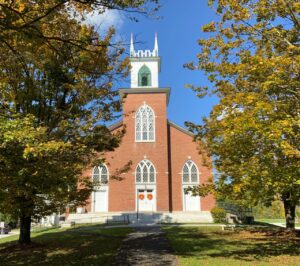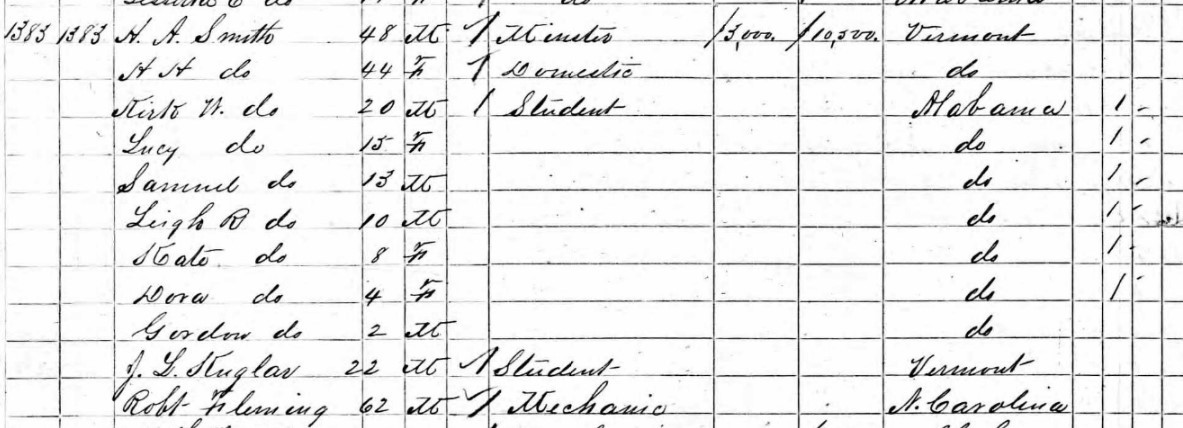New England Congregational church minute books from the nineteenth century abound in routine facts: admissions, dismissals, committee reports and the like that do not make for compelling reading. Ivy Dixon, historian of the Pittsford Congregational Church, found this remarkable episode appearing intermittently from 1842 to 1850. Long forgotten, this story of one expatriate church member has undercurrents that still haunt us today.
Hannah Weed Hitchcock (1815–1898), daughter of John Hitchcock (1760–1836) and his second wife Lucy Ripley, later Manley (1789–1865), became a member of the church in 1834. Hannah’s father served as a soldier in the American Revolution. She was named for John Hitchcock’s first wife, Hannah, who died in 1814, having given birth to nine babies, all of whom died in infancy! Hitchcock’s second family had exceptional educations for the times: sons William graduated from Andover Theological Seminary, and John Hitchcock, dead at 25, attended Middlebury College but left for a stint in Alabama to improve his health. The Hitchcock daughters also had impressive educations: Frances graduated from Mt. Holyoke Female Seminary, and Elmira from Burlington Female Seminary. Hannah likely had qualifications equal to those of her sisters. In 1838, she left Vermont to teach in Alabama. There she married Horatio Austin Smith (1811–1891), a Vermont native, who became an ordained Presbyterian minister.
Hannah evidently made trips home to Pittsford to visit family. Pittsford Congregational Church minutes from 25 September 1842 record the following:
They have confirmed with the husband of Mrs. Smith who was in town and her brother [John] and find that she has brought a slave for purposes of domestic convenience and pecuniary profits. Church voted the subject to be referred back to the committee with instructions to correspond with Mrs. Smith and procure her reasons for engaging in slavery.
This controversy dragged on for eight years, coming to a head in 1850. The church sent at least two letters of admonition to Hannah. On 28 June 1850, the church minutes noted “she responded with the circumstances in which she is placed justify her in purchasing and holding a person in slavery. The church after long deliberation on the subject passed the following … that the charges brought against her are sustained.” Three months later, on 27 September 1850, Pastor Charles Walker wrote “Whereupon the church voted, in view of the charges against Mrs. Smith … that she be excommunicated from our body.” No other record exists for the excommunication of a church member.
The case of Hannah Hitchcock Smith reminds us that up until the Civil War, Christian churches were divided on the subject of slavery.
The case of Hannah Hitchcock Smith reminds us that up until the Civil War, Christian churches were divided on the subject of slavery. Many southern Baptist and Episcopal churches condoned slavery, citing its presence in the Bible. By the 1840s, most New England Congregational ministers allied themselves with the abolitionist movement. Pittsford was no exception. Hannah’s excommunication, however, did not deter her or her husband in their church work. Nor did it diminish their capacity as slaveowners.
At the time of the 1860 census for Bibb County, Alabama, the H. A. Smith household looks straightforward enough, as seen below:
Take a closer look at what the numbers mean. H.A. Smith has $3000 worth of real estate, but $10,500 in personal estate. Why such a discrepancy between the two values, especially for a minister? To find the answer, one has to search a separate census schedule for Bibb County slave owners.
H. A. Smith owned nine slaves, men, women, and children, between the ages of 47 and 2—none of whom are listed by names. Undoubtedly, the statistics represented a family who could have been bought and sold at will. Though we all learned about slavery in our past American history classes, it becomes more real when it hits this close to home — slave owners with ties to Pittsford, my home town.
Hannah (Hitchcock) Smith died in Columbiana, Alabama, on 4 February 1898, age 82. The Shelby Sentinel of Calera, Alabama, published an obituary under the headline of “Death of a Mother in Israel,” with these words: ”The death angel claimed as his own Mrs. Hannah Smith, the venerable relict of the late Rev. H. A. Smith of the Presbyterian Church… A noble Christian woman, she has fought a good fight, finished her course, and gone to her reward, leaving an example well worthy of imitation.” The Pittsford Congregational Church would not have agreed.
Share this:

About Michael Dwyer
Michael F. Dwyer first joined NEHGS on a student membership. A Fellow of the American Society of Genealogists, he writes a bimonthly column on Lost Names in Vermont—French Canadian names that have been changed. His articles have been published in the Register, American Ancestors, The American Genealogist, The Maine Genealogist, and Rhode Island Roots, among others. The Vermont Department of Education's 2004 Teacher of the Year, Michael retired in June 2018 after 35 years of teaching subjects he loves—English and history.View all posts by Michael Dwyer →

